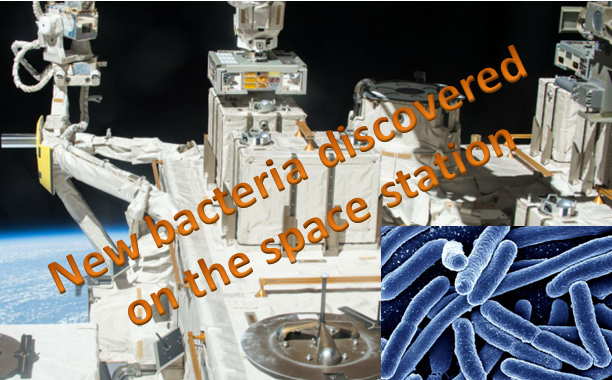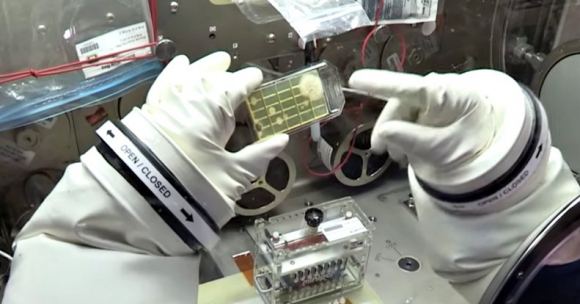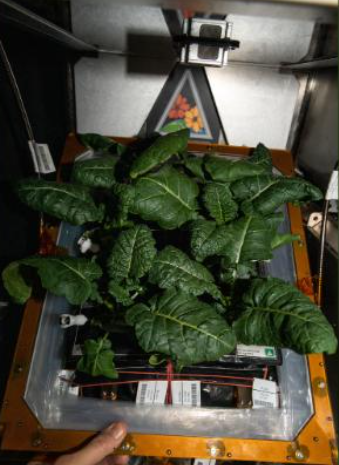Unique new bacteria discovered at the space station that may help growing plants
 Scientists at the ISS (International Space Station) have been frequently checking eight locations of the spaceship over the last six years for the presence of microorganisms’ growth. Hundreds of bacteria samples have been collected and studied, with a thousand more waiting to return to Earth for analysis.
Scientists at the ISS (International Space Station) have been frequently checking eight locations of the spaceship over the last six years for the presence of microorganisms’ growth. Hundreds of bacteria samples have been collected and studied, with a thousand more waiting to return to Earth for analysis.
A study published in the Journal Frontiers in Microbiology (“Methylobacterium ajmalii sp. nov., Isolated From the International Space Station” by Swati Bijlani, Nitin K. Singh, V. V. Ramprasad Eedara, Appa Rao Podile, Christopher E. Mason, Clay C. C. Wang, and Kasthuri Venkateswaran, 15 March 2021, Frontiers in Microbiology) described the discovery of four new unique bacteria, on the ISS. The bacteria belonging to the family of Methylobacteriaceae were isolated from different locations on the ISS in two consecutive flights.
One of the four organisms was previously known and was identified as Methylorubrum rhodesianum.

Three of the bacteria are unique and new. These Methylobacterium are Gram-negative, rod-shaped, catalase-positive, oxidase-positive, motile bacteria, pink–pigmented colonies. Cells are 1.6–1.8 μm wide and 2.2–3.2 μm long. These strains grew well on nutrient agar and R2A. Colonies on R2A agar are reddish-pink–pigmented, circular, convex, and smooth, with a diameter of approximately 0.6–1.0 mm after three days of incubation. These organisms are considered as novel species belonging to the Methylobacterium genus.
The three ISS novel strains grew optimally at temperatures from 25 to 30°C, pH 6.0 to 8.0, and NaCl 0 to 1%. Phenotypically, these three ISS strains resemble M. aquaticum and M. terrae since they assimilate similar sugars as sole carbon substrate when compared to other Methylobacterium species. However, the three novel ISS Methylobacterium strains are different from others in the genus Methylobacterium in some phenotypic characteristics. A novel designation was proposed within the genus Methylobacterium and the name Methylobacterium ajmalii sp. nov.
The phylogenetic and genetic uniqueness and different phenotypic properties were sufficient to categorize these three ISS strains as members of a distinct species different from other recognized Methylobacterium species. These strains represent a novel species of the genus Methylobacterium, for which the name Methylobacterium ajmali sp. nov. is proposed.

Species of Methylobacterium are helpful to plants, promoting their growth and fighting pathogens that affect them. Also, Methylobacterium species are involved in nitrogen fixation, phosphate solubilization, abiotic stress tolerance (such as temperature extremes, drought, salinity, and heavy metals), and plant growth promotion. The new strains may be helpful to assist with the growth of plants in space. Therefore, these new bacteria may possess a useful genetic characteristic that facilitates the growth of crops in space. The strains may be used to help grow plants during long-term spaceflight missions in the future.
These bacteria have been most likely transferred to the ISS from Earth, rather than coming from outer space. The bacteria have either survived since the station’s inception or were introduced when new astronauts or payloads arrived.
The ISS scientists are tasked with surveying the persistence of bacteria in the extreme conditions of space.
Hundreds of samples from the ISS containing bacteria have been analyzed, and thousands more samples have been collected from various other locations on the ISS and are awaiting a trip back to Earth to be examined. However, the goal is to eliminate the need of bringing the samples back to Earth and to analyze them in space using molecular microbiology.
Food growth in space is essential for the long trip such as for Mars missions. Certain types of bacteria can help facilitate the growth of food in space. Perhaps these new species can serve as an initial step for such development.
